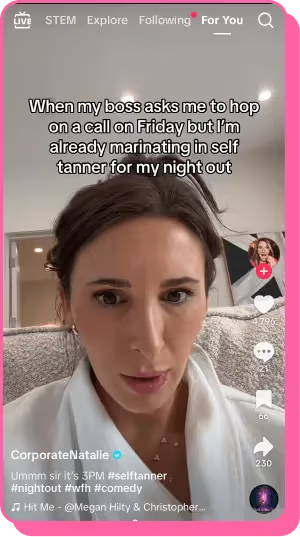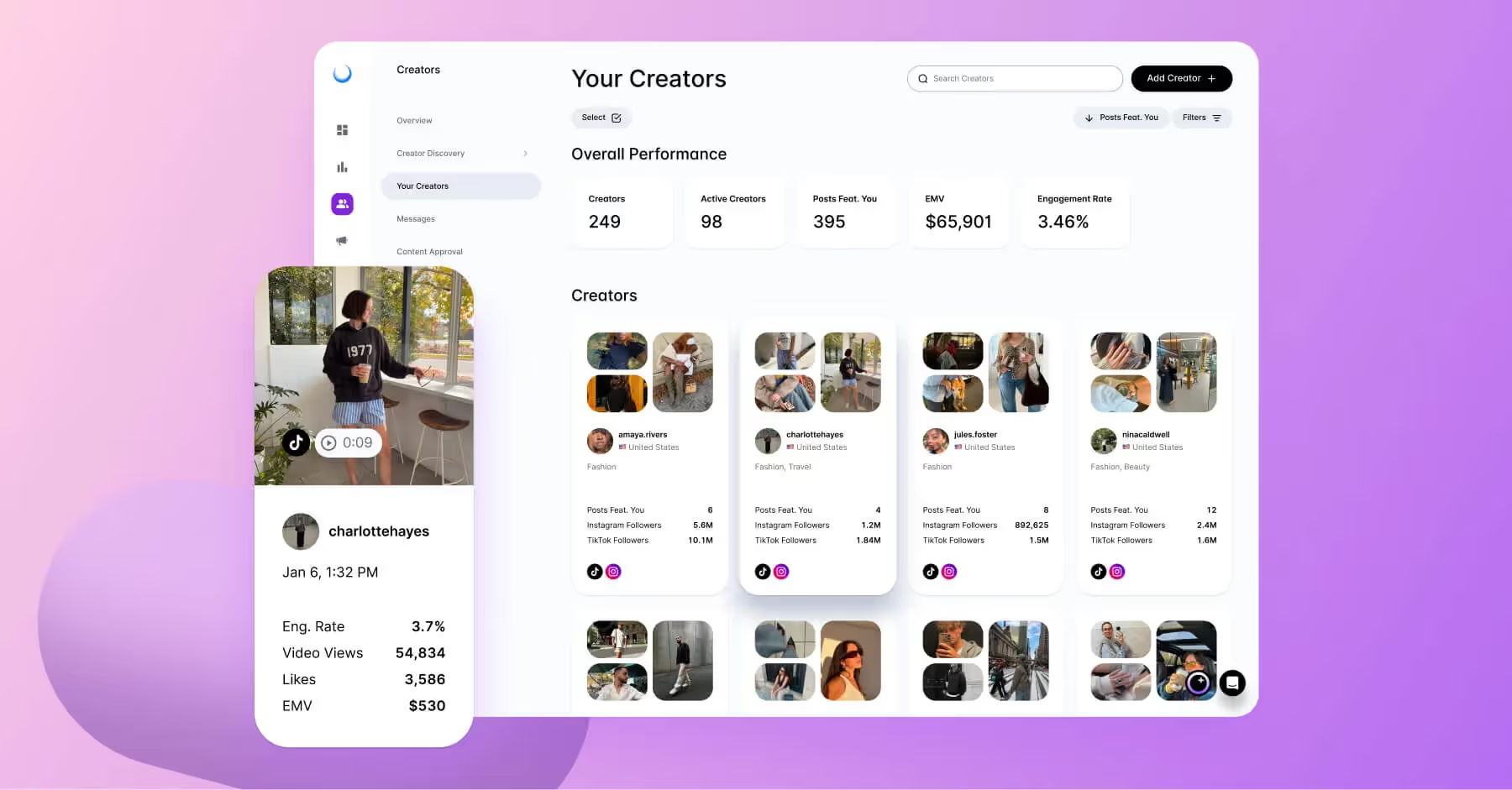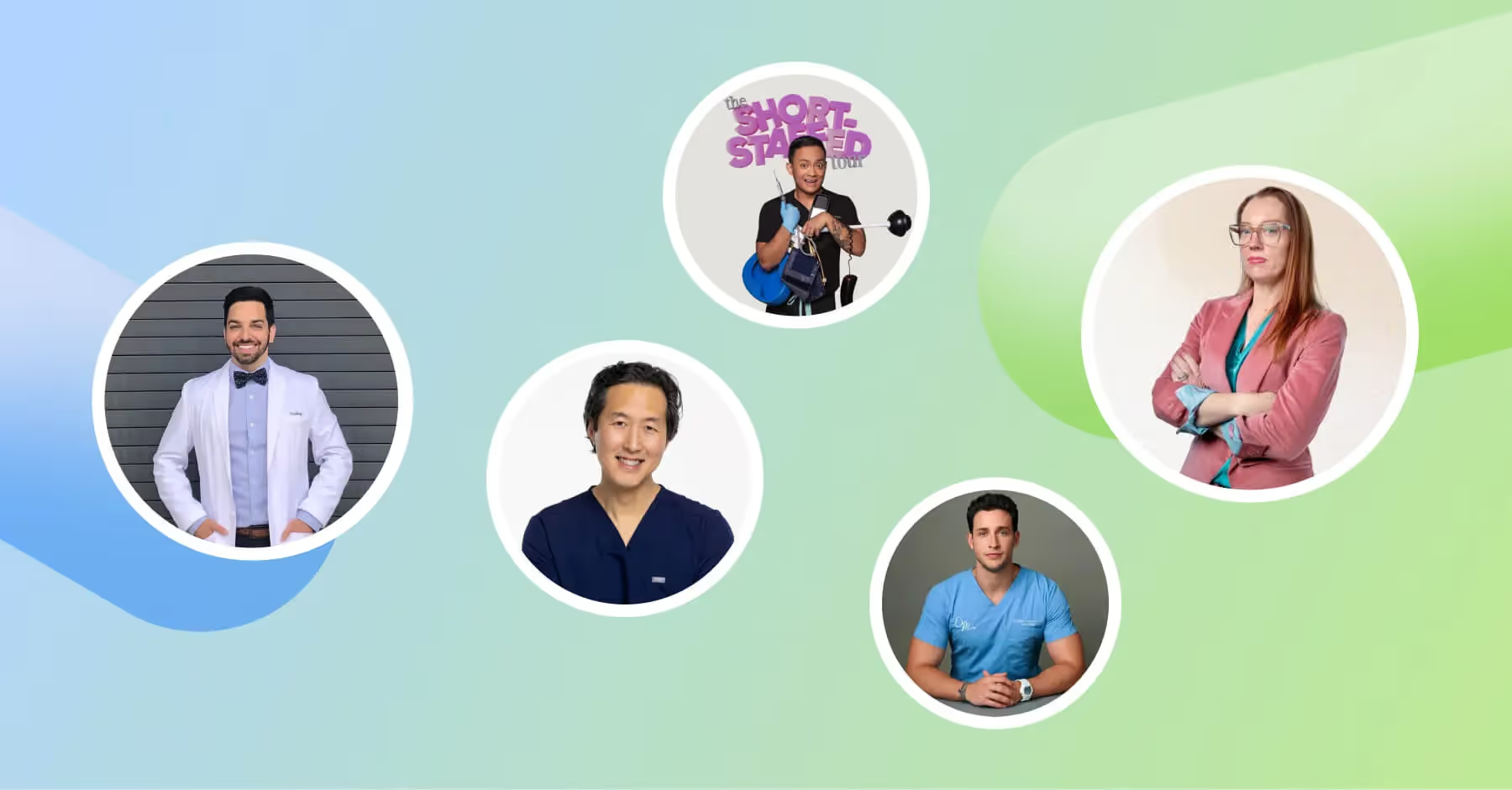B2B Influencer Marketing Tips
The B2B industry is slowly adopting influencers as part of its online strategies. Find out more about 10 popular B2B influencers.

The importance of social media for B2B marketing has been debated and proven without question. B2B businesses are now required to reflect on where influencer marketing fits within that statement.
While B2B marketing presents different challenges than B2C marketing, its impact is increasingly clear. In 2026, 53% of B2B marketers in the US will increase their influencer marketing budgets. This growing investment reflects marketing’s ability to boost brand awareness by reaching niche audiences.
In this blog, we look at what B2B influencer marketing is, its benefits, how to create a B2B influencer marketing strategy and which influencers marketers should be familiar with.
Key Takeaways:
- B2B influencer marketing targets business decision-makers through industry experts: Unlike B2C campaigns that focus on emotional appeal, B2B influencer partnerships prioritize thought leadership and professional credibility to influence purchasing decisions
- 53% of US B2B marketers will increase influencer budgets in 2026: This growing investment reflects the proven ability of B2B influencers to boost brand awareness and reach niche professional audiences who trust their expertise.
- B2B influencers humanize complex products while building trust: Industry experts can make technical solutions more relatable and approachable, while their third-party endorsement accelerates credibility with skeptical business buyers.
- LinkedIn dominates B2B influencer marketing platforms: The professional networking site connects brands with industry decision-makers in a business-focused environment, making it the preferred channel for B2B influencer campaigns.
- Featured B2B influencers span corporate comedy to finance education: Top performers include Corporate Natalie (1.2M Instagram followers), Neil Patel (615K), Ann Handley (484K LinkedIn), Jay Baer, and Vivian Tu (3.5M Instagram), each bringing unique expertise to business audiences.
What Is B2B Influencer Marketing?
B2B influencer marketing is the strategic approach of working with influencers, experts and thought leaders to promote B2B products or services. These influencers often bring built-in credibility and a loyal, targeted audience of decision-makers who trust their insights. By aligning with these figures, B2B brands can enhance their authority, expand their reach and build meaningful connections with potential customers. They add a layer of trust, credibility and professional authority to brand campaigns.
5 B2B Influencer Marketing Benefits
B2B marketing’s purpose is to formulate social media strategies that capture the attention of other businesses rather than individual consumers. These businesses sell products like restaurant equipment or services like social media management tools, which can typically be challenging to market on social media. Influencers help make it easier by allowing brands to incorporate UGC and influencer collaborations to reach specific audiences and brands. But that isn’t the only benefit.
Here are some more ways influencer marketing benefits B2B organizations:
1. Increase Awareness
B2B influencers differ from B2C, in the sense that they have acquired niche target audiences who value their professional opinions. Partnering with these influencers can broaden a brand's reach and diversify its demographics. Brand awareness is a crucial part of the sales process, as it garners interest from decision makers and increases your visibility within an industry.
2. Boost Thought Leadership
Consumers (especially in the B2B space) demand transparency, honesty and credibility now more than ever. Establishing your brand as one consumers trust can be difficult without that organic expert approval. B2B brands can establish themselves as trusted thought leaders by partnering with credible influencers whose influence is set to surpass that of the B2C market. Additionally, hosting events and even incorporating these industry leaders into campaigns can effectively boost your profile.
3. Humanizes Complex Products or Services
B2B influencers are just as engaging as they are knowledgeable. Their connection to their audiences has been built on trust, transparency, knowledge and authenticity. Authentic influencers can incorporate a personable approach to their message delivery, as audiences connect with their relatable and approachable content. This approachability humanizes complex products or services.
4. Amplify Reach and Visibility
Most social media users have go-to influencers they wholeheartedly trust, admire and listen to. This doesn’t stop with direct-to-consumer purchases — regardless of the industry, buyers are also often on social media. Therefore, partnering with the right influencers can maximize a brand's reach and visibility.
5. Accelerates Trust and Credibility
B2B influencers play a key role in making a brand feel more trustworthy and credible to potential buyers. When a respected voice in the industry endorses your company or shares insight tied to your offering, it signals authenticity and authority. This third-party validation helps cut through skepticism and positions your brand as a reliable, informed player worth paying attention to.
How To Create a B2B Influencer Marketing Strategy
As B2B buyers become increasingly aware of content-savvy consumers, incorporating influencers into a well-crafted digital strategy helps brands stand apart from competitors. Integrating B2B influencers elevates a brand’s impact, especially since influencers can significantly shape consumer attitudes. With that in mind, what exactly does it take to build a successful B2B influencer marketing strategy?
Set Goals
Setting goals is an essential first step in figuring our which B2B influencers you’ll work with. These goals should ladder up to specific objectives your company or team hopes to achieve. For example, is building brand awareness in a new country a key business goal? Building a campaign that includes popular influencers from your target country is a no-brainer tactic to tie directly to this goal.
Identify Target Audience
Pre-market research is inevitable for any business during social media strategy development. Identifying your target audience is one of the primary steps. This is especially important when discussing B2B marketing strategies, as brands need to be able to identify which campaigns will best align with their audience, resulting in the highest engagement rate. Once a target audience has been identified, brands can sort out which influencers are best suited to their brand mission, product and audience. The ideal spokesperson can boost a brand’s visibility and engagement.
Adopt a Creator Management Software
There are many creator management platforms that help brands find influencers who align with their strategic marketing and business goals. While some may think a partnership with the most followed influencers is always most successful, that is not the case. The best tactic for success is to find influencers with great engagement and community-valued opinions within the niche field your brand operates in.
Outreach Time
Once you’ve identified the right partners through a creator management platform, the next step is to reach out with intention and clarity. B2B influencers are often industry professionals with established credibility, so your outreach should reflect both professionalism and personalization. Start by referencing specific reasons that the influencer aligns with your brand. Whether it’s audience demographics, content style or industry expertise. Clearly outline your potential partnership’s value, including deliverables, timelines and general expectations. Remember to keep the conversation collaborative: invite questions, remain open to feedback and aim to build a long-term relationship rather than a transactional campaign.
Map Your Content
Mapping your content helps deliver real impact. It involves outlining the types of content you want influencers to create, like LinkedIn posts, webinars, case studies or thought leadership pieces — even better if they align with key stages of your buyer journey. Consider what your audience needs at each touchpoint, from awareness to decision-making and work with influencers to co-create content that communicates the right thing at each stage of the journey. It’s also wise to plan your content with a social media content calendar to ensure deadlines for deliverables and when to publish content are ultra clear. Ultimately, even a roughly mapped content plan keeps everyone aligned and maximizes campaign effectiveness while giving creators some room to keep things feeling natural and organic.
Prioritize Collaboration
In B2B marketing, success doesn’t come from doing it all, it comes from doing it smart. B2B influencers bring a unique mix of content creation skills and industry expertise, making them valuable partners in communicating ideas with credibility and clarity. Collaborating with these influencers allows brands to amplify their message through high-impact content that resonates with niche audiences and decision-makers alike.
Continue To Nurture Influencer Relationships
While you might find influencers you’ll work with for extended periods of time, you should always keep an eye on which influencers competitors work with, new creators in your industry’s niche and any other new opportunities to work with influencers you might not have explored earlier.
Along with this, nurturing the influencers you actively work with is important, too. Tap into their expertise and reputation for webinars, event activations and any other opportunities you have to find win-win opportunities together.
5 B2B Influencers To Know
B2B Influencers can boost brand value in various ways — the takeaway is their ability to connect your brand's solution to pain points seamlessly, by enforcing their professional authority to their loyal and receptive audiences.
Here are a few B2B Influencers you may want to keep an eye out for:
1. Corporate Natalie (@corporatenatalie)
- Instagram Followers: 1.2M
- Active on: LinkedIn, TikTok, Instagram, LinkedIn
Corporate Natalie creates comedic style content, with a focus on the corporate environment. She makes relatable content, and has gained her following as a result of the comedic relief she provides. Her audience feels a sense of escapism through her parody content which sheds light on the realities of the corporate world in a manner which many wish they could alternatively operate within.

2. Neil Patel (@neilpatel)
- Instagram Followers: 615K
- Active on: LinkedIn, Instagram, TikTok
Neil Patel is an influencer who primarily makes content for businesses as well as aspiring entrepreneurs. He offers knowledgeable advice on how to grow your brand, leverage social media for profit, entrepreneurial growth and mindset practices that ensure success.

3. Ann Handley (@AnnHandley)
- LinkedIn Followers: 484K
- Active on: LinkedIn, Instagram
Ann Handley is a digital marketing and content expert, who is also an author, writer and keynote speaker. Her areas of expertise are primarily centered around how businesses and brands can leverage various platforms to create successful engaging content. She strongly reinforces the importance of igniting your business through strategic content marketing strategies with insightful takes on AI. She is an ideal influencer to partner with as her expertise on digital marketing reiterates her ability to successfully create targeted brand awareness and reach.

4. Jay Baer (@jaybaer)
- Instagram Followers: 31.3K
- LinkedIn Followers: 53K
- Active on: Instagram, LinkedIn
Jay Baer is a customer experience expert, advisor and researcher. Additionally, he is a respected and well known keynote speaker, with a podcast. He conducts insightful interviews with industry leaders who have already reached their heights of success, which his followers look forward to for advice. His expertise on the importance of creative and stellar customer experience, gives newcomer brands insight into how they can establish themselves in their respective industries. His captivating story telling style of delivery, positively engages his audience who hang on to his every word.

5. Vivian Tu (@yourrichbff)
- TikTok Followers: 2.7M
- Instagram Followers: 3.5M
- LinkedIn Followers: 51K
- Active on: TikTok, Instagram, LinkedIn
Vivian Tu teaches economic and finance literacy to her audience. She appeals to a younger audience with her youthful yet engaging and knowledgeable approach to content creation and delivery. She simplifies complex terms, making it more digestible for those who are attempting to further their understanding. She has branded herself as an approachable ‘Wall Street Girly’ who strives to make personal finance knowledge more accessible.

Simplified Influencer Marketing for B2B
If it wasn’t already clear, B2B brands can boost their influence with creators. Through Dash Social’s Creator Management Platform, the tedious tasks of finding, managing and paying influencers are simplified. Dash Social’s Creator and Influencer Marketing Solutions let you discover the earned media value of creators, track deliverables, easily find UGC and source reliable, verified data.
B2B Influencer FAQs
What is the best influencer marketing platform for B2B?
The best influencer marketing platform for B2B industries ultimately depends on your goals. LinkedIn is a popular platform for B2B influencer marketing because it connects brands with industry professionals and decision-makers in a business-focused setting.
What is the difference between B2B and B2C influencer marketing?
Unlike B2C influencer marketing, which emphasizes reach, trends and emotional appeal to consumers, B2B efforts prioritize authority, thought leadership, and relationship-building to influence purchasing decisions over time.






